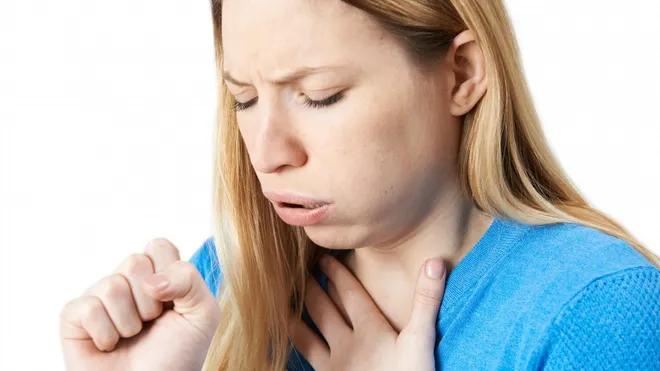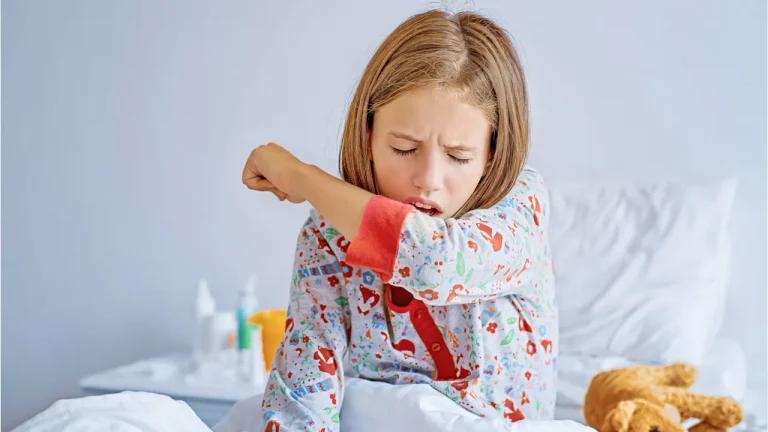
Diagnosing whooping cough in its early stages can be difficult because it starts with cold-like symptoms such as sneezing and runny nose. Young infants under the age of one year are one group at high risk of infection and serious problems from whooping cough. Lets take a look at what whooping cough is and what to do if you or a family member in your household has been diagnosed with it.
📝 What causes whooping cough?
Bordetella pertussis is the name of the bacteria that causes whooping cough. When a person is infected, the bacterial cells enter the upper respiratory tract, attach to ciliated cells (hair-like extensions on cells) and start to produce toxins. The toxins damage airways, causing the airways to swell and increase mucus production. This results in coughing fits of increased intensity and other symptoms.
📝 Is whooping cough contagious?
Yes. Whooping cough spreads from person to person as an airborne infection. During coughing spells, sneezing or even talking, micro-droplets from the nasal cavity and throat are released into the air, where they can then be inhaled by others. Close contact between an infected person and an uninfected person can lead to infection.
Many babies, young children and older children who get whooping cough are infected by their siblings or other family members who may not know they have it.
📊 Symptoms of whopping cough
Stage 1 lasts about 1–2 weeks and resembles symptoms of a common cold:
- Runny nose
- Sneezing
- Sore throat
- Slight fever
- Mild cough
Stage 2 lasts around 1 week
- Rapid severe coughing bouts, followed by a distinctive whoop sound
- Vomiting thick mucus after coughing spells
- Young babies and children may not cough, but may have difficulty breathing instead
Stage 3 lasts 2–3 weeks
- There is a gradual improvement in coughing fits and severity
- The cough becomes milder and less frequent
- Coughing fits may stop for a while, but they can return when you get another respiratory infection
💊 Treatment
Antibiotics
If whooping cough is diagnosed within 2 weeks of a cough starting antibiotics are given. Antibiotics won’t usually help with symptoms but may help to prevent the infection spreading to other people. Recommended antibiotics include azithromycin, erythromycin, co-trimoxazole and clarithromycin but choice of antibiotic will depend on the healthcare provider.
It is not recommended to await test results from blood tests or throat swabs before commencing antibiotics if whooping cough is suspected. Even if the infection isn’t confirmed yet, adult particularly working in healthcare should stay off work. Children and older adolescents should also remain home and only return to school until 48 hours after taking antibiotics.
Treating the symptoms
The cough associated with whooping cough will gradually resolve on its own but there is no specific treatment. Over the counter medication such such as paracetamol or ibuprofen maybe recommended to help with a fever and sore throat.
Treatment for severe symptoms
Some people with whooping cough may need to go into hospital for treatment. People most at risk of severe complications tend to be:
- Infants under one year old. Serious complications can be life-threatening for infants younger than 6 months of age
- Pregnant women, especially those in the third trimester
- People with chronic respiratory system illnesses and other health conditions
Supportive care
Other measures can help ease whooping cough symptoms include:
- Drinking lots of fluids
- Plenty of rest
- Small frequent meals to avoid vomiting
- Avoiding taking cold and cough medicines, unless prescribed by a healthcare professional
- Keeping away from irritants that may trigger a coughing bout
- If someone in your household has whooping cough, keep them isolated from others, especially from infants, people with health conditions or individuals who have not had the whooping cough vaccine
- Frequent hand washing
- Not sharing utensils
- Wear a mask
- Covering your mouth when coughing
- Clean and disinfect toys used by babies and children
🏥 Complications
Full recovery is common, but serious complications can be life-threatening;
- Infants may have a pause in their breathing, called apnea, dehydration, pneumonia, seizures or brain damage
- In older children and adults they may develop sore ribs, a hernia, middle ear infections or urinary incontinence
📝 Conclusion
Antibiotics can prevent the spread and treat whooping cough but if you develop more serious symptoms hospital care could be needed. The best way to prevent whooping cough is to get vaccinated. The NHS (National Health Service) and the CDC (Centers for Disease Control and Prevention) recommends vaccination for certain groups of people. Speak to your healthcare provider about vaccination programmes.
Sources
- Whooping cough – NHS
- Whooping cough – Symptoms & causes – Mayo Clinic
- Whooping Cough (Pertussis): Causes, Symptoms & Prevention
- Whooping cough – Health topics A to Z – CKS – NICE
- Pertussis (Whooping Cough) – Whooping Cough – CDC
- Whooping cough (Pertussis) – Information for cases and their families – NHS Fife
Medical Disclaimer
NowPatient has taken all reasonable steps to ensure that all material is factually accurate, complete, and current. However, the knowledge and experience of a qualified healthcare professional should always be sought after instead of using the information on this page. Before taking any drug, you should always speak to your doctor or another qualified healthcare provider.
The information provided here about medications is subject to change and is not meant to include all uses, precautions, warnings, directions, drug interactions, allergic reactions, or negative effects. The absence of warnings or other information for a particular medication does not imply that the medication or medication combination is appropriate for all patients or for all possible purposes.








